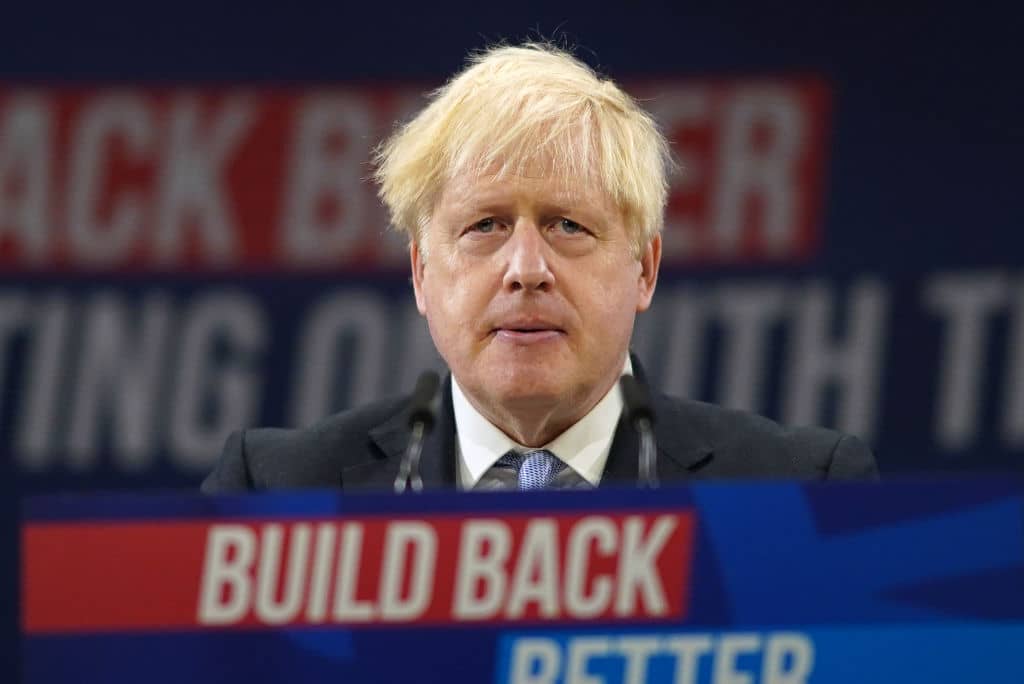When Boris Johnson addressed his party in his first in-person conference leader’s speech since winning a majority of 80 seats, he did it in a different hall to the room his ministers have spoken in this week. The larger set not only helped make the Prime Minister’s speech stand out, it also meant that it could take on the form of a rally. The main stage was surrounded by supporters holding placards with various government slogans. It was a theme of Johnson’s rallying speech as he crowbarred ‘levelling up’ and ‘build back better’ (at one point morphing into ‘build back beaver’) into a lively address to his party — aimed at reminding them why he was an election winner.
After complaints on the fringes of Tory party conference over the idea the party is moving to the left, Johnson used his speech to talk up his conservative credentials. He credited the vaccine rollout with transforming the political landscape from a year ago but pressed the point that it was he who chose to lift all restrictions in July when many — including the opposition — were having doubts. That decision, he argued, meant that the UK was ahead in its recovery. Johnson suggested that he was the liberal politician and had Starmer been in charge the country would still be in lockdown.
As one government adviser remarked to me recently, Johnson is currently in ‘world king mode’
On the economy, Johnson justified his national insurance rise by invoking Margaret Thatcher and also linking it with the NHS waiting lists. He still insisted his party was one that championed low tax — suggesting that growth would allow the Conservatives to return to cutting taxes eventually. He pitched Labour as a party obsessed with taxing the rich and punishing those who are successful: ‘They like decapitating the tall poppies and taxing until the pips squeak’.
On levelling up, Johnson refused to bow to criticism that the agenda is too broad as it currently stands. He threw many things — from education to planning reform — into the levelling up folder. He also hinted that plans for serious radical planning reform are effectively dead. Johnson talked about protecting the countryside from ugly developments and argued that levelling up would be good for the south as new homes in the midlands and north would ease pressures elsewhere.
As for Labour, Johnson went on the offensive — sending Keir Starmer up with various jokes. He said that Labour were interested only in levelling down and depicted Starmer as a weak indecisive leader who would be a disaster if in charge. After the Labour leader called Johnson ‘trivial’ in his speech last week, the Prime Minister hit back by comparing Starmer to ‘a seriously rattled bus conductor pushed this way and that by a Corbynista mob of sellotaped-spectacles sans-culottes’ and ‘the skipper of a cruiseliner captured by Somali pirates, desperately trying to change the course and then changing his mind’.
Another area where Johnson clearly believes he can make hay against Labour is the culture wars. He criticised ‘know-nothing cancel culture iconoclasm’ and said it was important to defend our history. He echoed the comments of ministers this week at fringe events on the need to get workers back to the office. In terms of new announcements, the speech was more about rhetoric than unveiling policy. After a series of tetchy media appearances, Johnson will have reassured his supporters with a confident performance that contained many of the jokes and turns of language that he is known for.
What was the up shot of the speech? As one government adviser remarked to me recently, Johnson is currently in ‘world king mode’, a reference to his putative ambition at the age of four. The Prime Minister is in a bullish mood and today’s speech cemented the powerful position he is in with regards to his party. This is the first conference in five years where the party is not in a crisis of its own and today’s speech took advantage of the political weather. It succeeded in boosting the Tories and reminding them why they backed him and continue to — but it didn’t say much that was new. With many problems coming down the track on the economy, energy and general cost of living, Johnson could soon find himself under pressure to show that he has fresh answers to looming painful questions.







Comments